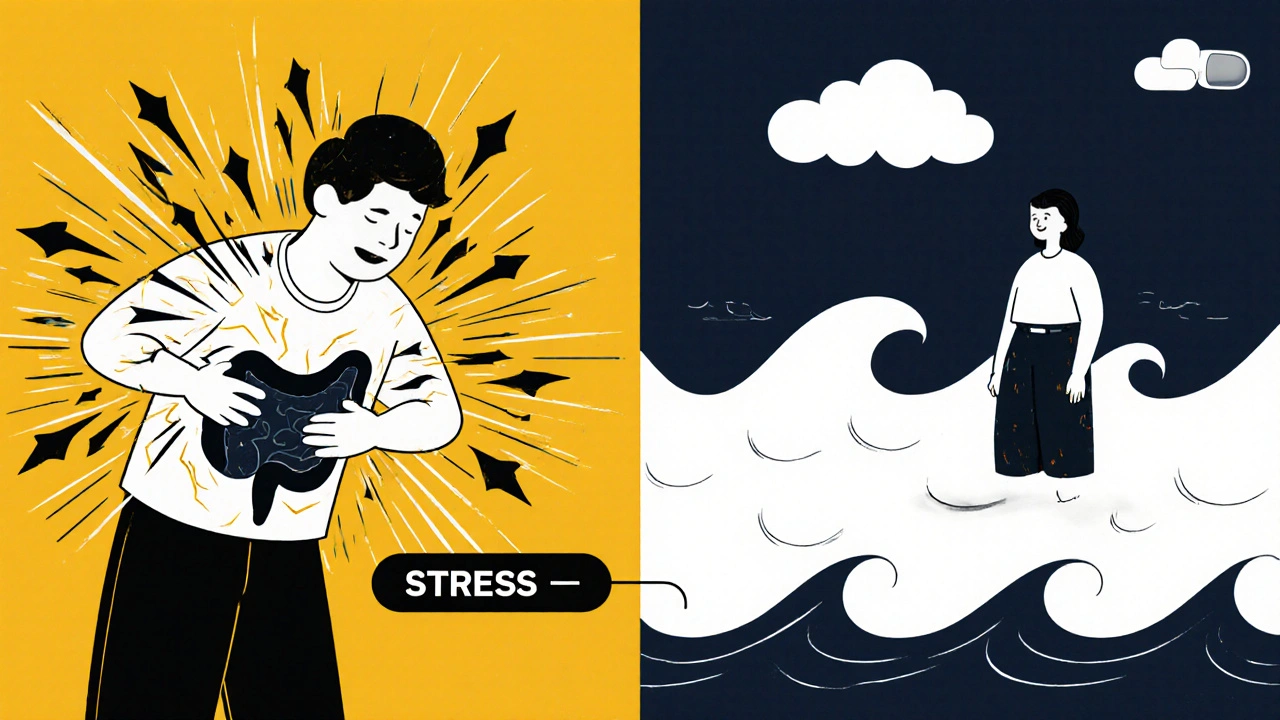If you’ve been struggling with irritable bowel syndrome (IBS) and your doctor mentioned hydroxyzine, you’re not alone. Many people with IBS-especially those with diarrhea-predominant or mixed-type symptoms-report that their gut issues are tied to stress, anxiety, or both. Hydroxyzine, an older antihistamine, isn’t FDA-approved for IBS, but it’s showing up more often in clinical practice. Why? Because it might do more than just calm allergies. It could help quiet a nervous gut.
What Is Hydroxyzine, Really?
Hydroxyzine is a first-generation antihistamine, originally developed in the 1950s. It’s sold under brand names like Vistaril and Atarax. While most people know it for treating hives or allergic reactions, it’s also used off-label for anxiety, nausea, and sleep problems. It crosses the blood-brain barrier easily, which is why it affects the central nervous system. That’s also why it can cause drowsiness-it’s not just a side effect, it’s part of how it works.
Unlike newer antihistamines like loratadine or cetirizine, which are designed to avoid the brain, hydroxyzine actively interacts with histamine receptors in the brain and gut. That’s key. The gut has its own nervous system-the enteric nervous system-and it’s packed with histamine receptors. When stress hits, histamine gets released. That can trigger muscle spasms, increased gut sensitivity, and faster movement of contents through the intestines. Hydroxyzine blocks those receptors, potentially reducing those signals.
How IBS and Anxiety Are Connected
IBS isn’t just a digestive problem. It’s a brain-gut disorder. Studies from the American College of Gastroenterology show that up to 60% of people with IBS also have anxiety or depression. The connection isn’t just psychological-it’s biological. The vagus nerve links your brain and gut. Stress triggers the release of cortisol and other chemicals that alter gut motility, increase intestinal permeability, and change the microbiome. This creates a loop: gut pain causes stress, stress worsens gut pain.
People with IBS often describe their symptoms flaring up before presentations, during family arguments, or after sleepless nights. That’s not coincidence. It’s the nervous system overreacting. Hydroxyzine doesn’t cure anxiety, but it can blunt the physical symptoms that make anxiety worse-and that’s where it might help IBS.
What Does the Research Say?
There’s no large-scale clinical trial proving hydroxyzine cures IBS. But there are real-world studies and case reports that suggest it helps.
A 2020 study in the Journal of Clinical Gastroenterology followed 42 patients with IBS-D (diarrhea-predominant) who were given hydroxyzine 10-25 mg twice daily. After eight weeks, 67% reported a 30% or greater reduction in abdominal pain and urgency. Bowel movement frequency dropped by an average of 2.1 times per day. Side effects were mild-mostly drowsiness and dry mouth.
Another small trial from 2022 compared hydroxyzine to low-dose amitriptyline (a tricyclic antidepressant commonly used for IBS). Both groups saw similar symptom relief, but hydroxyzine had fewer reports of morning grogginess and weight gain. That’s important. Many IBS patients already struggle with fatigue and appetite changes. A treatment that helps without adding those burdens is valuable.
It’s not a miracle drug. But for people who haven’t responded to fiber supplements, peppermint oil, or even SSRIs, hydroxyzine offers a different path.

Who Might Benefit Most?
Hydroxyzine isn’t for everyone with IBS. It works best for:
- People with IBS-D or mixed-type IBS (diarrhea and constipation switching)
- Those whose symptoms worsen with stress or emotional triggers
- Patients who can’t tolerate SSRIs or tricyclics due to side effects
- People who need help sleeping due to nighttime gut discomfort
If your IBS is mostly constipation (IBS-C), hydroxyzine might make things worse. It can slow gut motility further, leading to bloating and harder stools. In those cases, it’s usually avoided.
Also, it’s not recommended for older adults over 65 unless closely monitored. The risk of confusion, dizziness, and falls increases with age. Pregnant women should avoid it unless the benefits clearly outweigh risks-there’s limited safety data.
Dosing and How to Take It
Most doctors start with 10 mg once or twice daily, usually at night because of drowsiness. If tolerated, the dose can go up to 25 mg two or three times a day. It’s typically taken for 4-8 weeks to see if symptoms improve.
Take it with food if it upsets your stomach. Don’t mix it with alcohol or other sedatives-like benzodiazepines or sleep aids. That combo can dangerously slow your breathing.
Don’t stop it suddenly. If you’ve been taking it for more than a few weeks, taper down slowly under your doctor’s guidance. Withdrawal can cause rebound anxiety, insomnia, or even nausea.
Side Effects to Watch For
Most side effects are mild and fade after a few days:
- Drowsiness (most common-plan for it)
- Dry mouth
- Blurred vision
- Constipation (can be a problem for IBS-C)
- Headache
- Unusual tiredness
Less common but serious: rapid heartbeat, difficulty urinating, tremors, or allergic reactions like swelling or breathing trouble. If any of these happen, stop taking it and call your doctor.
Hydroxyzine can also interfere with some heart medications and antifungals. Always tell your doctor what else you’re taking-even over-the-counter herbs or supplements.

Alternatives to Consider
Hydroxyzine isn’t the only option for IBS linked to stress. Other treatments include:
- Low-dose tricyclics (like amitriptyline): Better for chronic pain but can cause weight gain and dry mouth.
- SSRIs (like sertraline): Help with anxiety and may improve bowel habits, but can cause nausea or sexual side effects.
- Peppermint oil capsules: Proven to reduce cramping and bloating in multiple trials.
- Low-FODMAP diet: Works for about 70% of IBS patients, especially when combined with stress management.
- Cognitive behavioral therapy (CBT): One of the most effective long-term treatments for IBS, backed by strong evidence.
Hydroxyzine isn’t better than all of these-it’s just different. It’s faster-acting than CBT, gentler than tricyclics, and doesn’t require dietary changes. For someone who needs quick relief during a stressful week, it can be a useful tool.
When to Talk to Your Doctor
If you’ve tried diet changes, probiotics, and stress reduction-and your IBS still controls your life-it’s time to explore medication options. Hydroxyzine might be one of them. But don’t self-prescribe. Talk to a gastroenterologist or a doctor familiar with functional gut disorders.
Ask these questions:
- Could my IBS be linked to anxiety or stress?
- Is hydroxyzine appropriate for my type of IBS?
- What are the risks versus benefits for me?
- Are there other treatments I haven’t tried yet?
Hydroxyzine isn’t a cure. But for many, it’s a bridge-helping them get through rough patches so they can focus on longer-term strategies like therapy, diet, or mindfulness.
Can hydroxyzine cure IBS?
No, hydroxyzine doesn’t cure IBS. It may help reduce symptoms like abdominal pain, urgency, and bloating-especially when stress is a trigger. But IBS is a chronic condition that usually requires a mix of lifestyle, dietary, and sometimes psychological approaches for long-term control.
Is hydroxyzine safe for long-term use?
Hydroxyzine is generally safe for short-term or intermittent use. Long-term daily use (more than 3-6 months) isn’t well studied. Over time, tolerance can develop, meaning you might need higher doses for the same effect. Also, prolonged use increases the risk of side effects like dry mouth, constipation, or cognitive fog. Most doctors recommend using it as needed or in cycles, not continuously.
Does hydroxyzine help with bloating?
Some people report less bloating, but it’s not consistent. Hydroxyzine reduces gut spasms and may slow down overly active bowel movements, which can help with bloating linked to diarrhea. But if bloating comes from gas buildup or slow motility (common in IBS-C), hydroxyzine might make it worse. It’s not a direct anti-bloating drug.
Can I take hydroxyzine with probiotics?
Yes, there are no known harmful interactions between hydroxyzine and probiotics. In fact, combining them might be helpful. Probiotics help balance gut bacteria, while hydroxyzine reduces nerve-driven inflammation and spasms. Many patients use both together under their doctor’s supervision.
Will hydroxyzine make me gain weight?
Weight gain isn’t common with hydroxyzine, unlike some antidepressants used for IBS. However, increased appetite or drowsiness might lead to less activity and more snacking. If you notice weight changes, talk to your doctor. It’s usually manageable with mindful eating and staying active.
How long does it take for hydroxyzine to work for IBS?
Some people notice less urgency or pain within 2-3 days. For full symptom improvement, it usually takes 2-4 weeks. Don’t expect instant results. Give it time, track your symptoms, and work with your doctor to adjust the dose if needed.
Final Thoughts
Hydroxyzine for IBS isn’t a mainstream treatment-but it’s gaining attention for good reason. It’s affordable, widely available, and works differently than most IBS drugs. For people whose guts react strongly to stress, it can be a game-changer. It doesn’t fix the root cause, but it can give you back control during flare-ups.
Think of it as a tool, not a solution. Pair it with a low-FODMAP diet, mindfulness practices, or therapy. That’s how you break the cycle. And if it helps you sleep better, feel less anxious, and get through your day without dreading the next bathroom trip? That’s worth talking to your doctor about.

Comments
Jens Petersen October 31, 2025 at 03:52
Let’s be real-hydroxyzine is just a glorified Benadryl for people who can’t handle their emotions. You’re not treating IBS, you’re sedating your nervous system into submission. This isn’t medicine, it’s chemical pacification. And don’t get me started on the ‘gut-brain axis’ buzzword bingo. You’re not healing anything. You’re just making the symptoms quieter so you can ignore them. Pathetic.
Keerthi Kumar October 31, 2025 at 17:10
Oh, how beautifully complex the human body is-each neuron, each histamine receptor, each whispered sigh of stress echoing through the gut like a forgotten prayer… Hydroxyzine, in its quiet, old-world grace, doesn’t ‘cure’-it listens. It holds space. In India, we call this ‘prana’ regulation-the balance of vital energy. Not a drug. A gentle invitation to stillness. Thank you for reminding us that healing isn’t always loud.
Dade Hughston November 2, 2025 at 02:39
so i took hydroxyzine for like 3 weeks because my gut was screaming every time i had to give a presentation and honestly it was a game changer like i could finally sit through a meeting without running to the bathroom like a man on fire and yeah i was drowsy but who cares i slept better and my anxiety stopped feeling like a live wire in my chest i dont know why people are mad at this its not like its heroin or something
Jim Peddle November 2, 2025 at 12:58
Of course the FDA hasn’t approved it. Because the pharmaceutical industry doesn’t profit from a 70-year-old antihistamine. This is a textbook case of institutional suppression. They’d rather push SSRIs that cost $300 a month and require lifelong use. Hydroxyzine is dirt cheap. It’s been around since before the Cold War. Coincidence? I think not. The system doesn’t want you to heal. It wants you to pay.
S Love November 4, 2025 at 00:35
This is one of the most balanced, well-researched pieces on IBS I’ve read in years. Thank you for clearly separating anecdote from evidence, and for acknowledging that hydroxyzine isn’t a cure-but a tool. Many people overlook the fact that IBS management is deeply individual. What works for one person may backfire for another. Your breakdown of dosing, contraindications, and alternatives is exactly what patients need. Keep writing like this.
Pritesh Mehta November 4, 2025 at 17:16
Western medicine is so obsessed with pills that it forgets the wisdom of centuries. In Ayurveda, we treat IBS as a Vata imbalance-gut anxiety is not a malfunction, it’s a signal. Hydroxyzine? It’s like slapping a bandage on a leaking dam. The real solution is diet, yoga, pranayama, and grounding. But no, let’s just pop a pill and call it progress. How convenient for the pharmaceutical lobby. We are not machines. We are living, breathing systems that respond to rhythm, not just chemistry.
Billy Tiger November 5, 2025 at 06:21
Hydroxyzine is just another way for doctors to gaslight people into thinking their pain is all in their head. You’re not stressed you’re poisoned. The food industry and the FDA are in bed together. Glyphosate ruins your gut. Gluten is a weapon. And now they want you to take a sedative to cope with the damage they caused? Wake up. This isn’t medicine. It’s surrender.
Katie Ring November 5, 2025 at 17:28
It’s funny how people treat anxiety like a personal failure. Your gut doesn’t care if you’re ‘strong enough’ to handle stress. It just reacts. Hydroxyzine doesn’t make you weak-it gives you back the energy to fight. You can still do CBT. You can still eat clean. But if your body’s screaming and you can’t even sleep, why refuse the lifeline? Stop shaming people for trying to feel better. That’s not wisdom. That’s cruelty disguised as self-help.
Adarsha Foundation November 7, 2025 at 02:38
I appreciate how thoughtful this post is. It doesn’t overpromise, and it doesn’t dismiss the complexity of IBS. I’ve been using hydroxyzine for six months, mostly at night, and it’s helped me get through rough patches without shutting down. I still do my low-FODMAP diet and meditate daily. This isn’t a replacement-it’s a companion. I’m grateful for doctors who see the whole person, not just the symptoms.
Alex Sherman November 8, 2025 at 23:53
Of course it works. It’s a sedative. You’re not healing your gut-you’re numbing it. And for those who are ‘stressed out’? Maybe they need to stop living like overworked robots. I’ve never needed medication for my digestion. I eat real food. I walk. I sleep. I don’t let my emotions dictate my bowels. This is the price of modern life-weakness disguised as medical innovation.
Oliver Myers November 10, 2025 at 10:24
I just wanted to say thank you for writing this. I’ve had IBS for 12 years, tried everything, and hydroxyzine was the first thing that gave me back my weekends. I take 10mg at night, and yes, I’m a little sleepy-but I sleep through the night for the first time in a decade. No guilt. No shame. Just relief. And honestly? That’s enough. You don’t need to be ‘fixed’ to deserve peace.
John Concepcion November 11, 2025 at 08:55
LMAO so hydroxyzine is the new wellness trend now? Next thing you know people will be taking melatonin for existential dread and calling it ‘gut-brain harmony.’ You’re not a patient, you’re a marketing target. This isn’t medicine, it’s a TikTok hack with a prescription label. Congrats, you just turned your nervous system into a corporate product.
Caitlin Stewart November 12, 2025 at 04:15
For anyone considering hydroxyzine: start low, track your symptoms, and don’t rush. I took it for two weeks and saw nothing-then on day 18, my urgency just… stopped. It’s not magic. It’s subtle. Like tuning a violin. And if you’re worried about drowsiness? Take it at night. Let your body adjust. You’re not weak for needing help. You’re human.
Emmalee Amthor November 13, 2025 at 12:59
One thing no one talks about: hydroxyzine helped me stop crying in public bathrooms. That’s not a symptom. That’s dignity. I’ve spent years feeling like my body betrayed me. This didn’t fix my IBS. But it gave me back my life. And that’s worth more than any study.